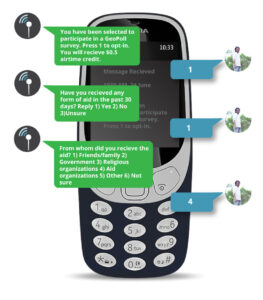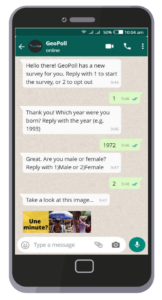- Contents
A self-administered survey is a questionnaire that is designed explicitly to be completed by a respondent without an interviewer’s assistance (or bias). Self-administered surveys are widely used for collecting quantitative research data.
Traditionally, self-administered surveys were distributed by mail or in-person to a large group of people and completed with paper and pencil. Although mail surveys are still standard in countries with a strong postal system, advances in technology have pushed many self-administered surveys online and to mobile phones. Utilizing digital survey tools enables researchers to gather data from almost any geographic location in less time and for less money than traditional methods.
In this post, we discuss several common and relatively new self-administered survey modes.
Types of Digital Self-Administered Surveys
Digital self-administered surveys range from simple text messages to elaborate web surveys with animation and video effects.
 SMS Surveys: A self-administered survey collected from
SMS Surveys: A self-administered survey collected from
respondents using short message service (SMS or text) through mobile network connections. SMS surveys are conducted as a 2-way text message conversation, with one survey question sent at a time. This method is ideal for some populations, such as those found in countries in sub-Saharan Africa or Latin America, because it does not require respondents to have internet connectivity.- Unstructured Supplementary Service Data (USSD) Surveys: USSD is a communication protocol on mobile phones that allows for real-time connection between a respondent’s phone and a mobile network or server to implement survey questions. Similar to SMS in functionality, USSD surveys do not require strong mobile network access to facilitate.
- Web Surveys: Web or Internet surveys utilize the Internet to sample and/or gather data from respondents. Respondents typically click a link to access web surveys on their smartphone, computer or tablet. Web surveys allow for complex question types and stimuli, including video, audio, picture, and matrix questions.
- Interactive Voice Response (IVR): IVR is a computer based data collection technology that enables computer systems to independently place calls and conduct surveys via audio recording, while voice and touch-tone detection technology are used to document respondent’s answers to survey questions. Voice recorded surveys of this nature enable respondents to answer a voice call and respond to survey questions by pressing 1, 2, or 3 on their keypad. Once mobile phone users pick up the call, they opt-in to complete the survey.
- Computerized-Response Audience Polling (CRAP): In a CRAP survey, a sample of telephone numbers is typically loaded into a computer for automatic dialing. CRAP surveys function similarly to IVR surveys, in that respondents use the keypad on their phone to answer pre-recorded voice survey questions one by one. What differentiates CRAP surveys is that they employ the digitized voice of someone presumed to be known by the sample, such as a celebrity or local newscaster.
- Computer Assisted Self-Interviewing (CASI): CASI surveys utilize specialized software to present individual questions to respondents visually on a computer screen. Respondents reply to each question using the computer’s keyboard or touchscreen. CASI surveys are administered without an interviewer, enabling respondents to confidentially answer questions of a sensitive nature.
- Audio Computer-Assisted Self-Interviewing (ACASI): ACASI surveys add a digitally generated or recorded voice-over to CASI survey questions. Respondents hear the survey questions read to them as they view the written questions on their computer screen. They answer the questions by typing in their responses using a keyboard or touchscreen.
 WhatsApp Surveys: WhatsApp is one of the most widely used messaging applications in the world. The explosion of WhatsApp in recent years has led to its development as an Internet survey platform. WhatsApp provides flexibility for the administration of complex mobile phone-based surveys that enable the exchange of rich media both to and from respondents, including photos, audio, video, GIFs, and animations.
WhatsApp Surveys: WhatsApp is one of the most widely used messaging applications in the world. The explosion of WhatsApp in recent years has led to its development as an Internet survey platform. WhatsApp provides flexibility for the administration of complex mobile phone-based surveys that enable the exchange of rich media both to and from respondents, including photos, audio, video, GIFs, and animations.
Conduct Self-Administered Surveys with GeoPoll
GeoPoll has experience designing and implementing self-administered surveys all over the world for clients ranging from global brands and international development organizations to local media stations and NGOs. We understand that every project is unique and are adaptable to a variety of research modes. Contact GeoPoll today to discuss which mode is best suited for your custom research project.

 SMS Surveys: A self-administered survey collected from
SMS Surveys: A self-administered survey collected from WhatsApp Surveys:
WhatsApp Surveys: